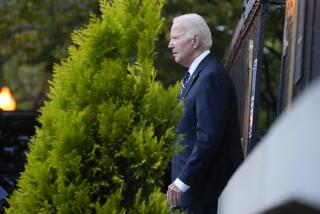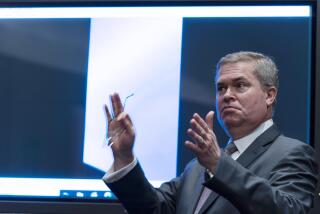Justice Department leaders brief lawmakers on Russia investigation
Congressional leaders met with Justice Department officials on Thursday for unusual, classified briefings demanded by Republicans on the FBI’s use of a confidential informant early in the Russia investigation in 2016.
It’s unclear exactly what details were provided during two meetings, which had been demanded by House Republicans who are close allies of President Trump as part of their inquiry into whether law enforcement and intelligence officials have mishandled the investigation that has shadowed Trump since he took office.
Trump has seized on revelations that an informant, reportedly a retired American professor living in England, interacted in 2016 with three of his campaign aides. The president claims that his campaign was spied on by political opponents in the Obama-era Justice Department.
“Starting to look like one of the biggest political scandals in U.S. history,” Trump tweeted on Thursday morning. “SPYGATE — a terrible thing!”
Former national security officials in both parties have rejected that contention, and Democrats who attended the briefings said nothing of the sort happened.
“Nothing we heard today has changed our view that there is no evidence to support any allegation that the FBI or any intelligence agency placed a ‘spy’ in the Trump campaign, or otherwise failed to follow appropriate procedures and protocols,” said a statement from the Democrats — House Minority Leader Nancy Pelosi, Senate Minority Leader Charles E. Schumer and the senior Democrats on the congressional intelligence committees, Sen. Mark R. Warner of Virginia and Rep. Adam B. Schiff of Burbank.
After Democrats and some Republicans objected to administration plans to brief only senior House Republicans, the meetings were expanded to include Democrats, and two were scheduled.
The meetings were unusual for a number of reasons.
Typically, law enforcement officials are reluctant to discuss any behind-the-scenes details on ongoing investigations, and the Russia case remains underway. Five people have pleaded guilty to various charges, mostly involving lying to the FBI. Trump’s former campaign manager, Paul Manafort, has pleaded not guilty to charges of financial crimes unconnected to the campaign. Thirteen Russians have been charged with interfering in the U.S. election.
Also unusual was the unexpected appearance at both briefings of the president’s new White House lawyer, Emmet Flood, which drew criticism from Democrats and legal observers. According to the White House, Flood and Chief of Staff John F. Kelly did not stay but made “brief remarks before the meetings started to relay the president’s desire for as much openness as possible under the law.”
Schiff called Flood’s presence “completely inappropriate.”
“As the White House’s attorney handling the special counsel’s investigation, his involvement — in any capacity — was entirely improper, and I made this clear to him,” Schiff said in a statement.
Conducting the briefings were Director of National Intelligence Dan Coats, FBI Director Christopher A. Wray and Deputy Atty. Gen. Rod Rosenstein, who supervises the work of special counsel Robert S. Mueller III.
The informant reportedly met with Trump campaign aides as the FBI in mid-2016 opened a counterintelligence investigation into suspicions that Moscow was trying to influence the election using hacked emails and divisive social media posts. U.S. intelligence agencies issued a report last year that Russia not only meddled in the election, but did so to help Trump beat Democratic nominee Hillary Clinton. Trump has denied any collusion with Russia, and Moscow has denied helping Trump.
The original inquiry prompted a criminal investigation now led by Mueller, who was named a year ago by the Justice Department. His team is examining whether anyone from Trump’s circle conspired with Russians and whether the president obstructed justice by interfering with the investigation.
Trump’s legal team, led by former New York Mayor Rudolph W. Giuliani, is also demanding more information about the informant and suggesting prosecutors will not get an interview with the president until that happens.
“We need to see reports on this spy situation, and see what the basis was, what the outcome was,” Giuliani told The Times. Learning about the informant, he said, could help determine “the legitimacy of the investigation.”
James Clapper, a retired Air Force general who served as director of national intelligence under former President Obama, also denied that Trump’s campaign was being spied on. Investigators were “trying to understand were the Russians infiltrating, trying to gain access, trying to gain leverage or influence, which is what they do,” he told ABC’s “The View.”
Thursday’s meetings were arranged following requests from Republicans led by Rep. Devin Nunes of Tulare, the chairman of the House Intelligence Committee and one of Trump’s most aggressive defenders. He previously demanded records involving a secret warrant used to eavesdrop on Carter Page, a former foreign policy advisor for Trump’s campaign whom the FBI suspected of being a Russian operative. Page has not been charged.
Nunes used the information to write a public memo sharply critical of the Justice Department for including opposition research funded by Democrats in the application for a surveillance warrant. A federal judge approved the warrant, and it was renewed three times by other judges.
Nunes’ office did not respond to a request for comment Thursday. House Speaker Paul D. Ryan (R-Wis.), who attended the first briefing along with Nunes and Rep. Trey Gowdy (R-S.C.), said he looked forward to “the prompt completion of the intelligence committee’s oversight work in this area now that they are getting the cooperation necessary.”
Plans for the meetings shifted multiple times in recent days, right up until the first one began at noon on Thursday. It was originally announced on Monday that Kelly would arrange a discussion among intelligence officials, law enforcement leaders and members of Congress. But it quickly became clear that only Republicans were to attend, though classified briefings for decades have been bipartisan.
Sarah Huckabee Sanders, the White House spokeswoman, mocked Democrats for assuming they would be “randomly invited,” but the administration later relented and organized a second meeting for the “Gang of Eight,” which includes House and Senate leaders of both parties.
However, Nunes and Gowdy, who chairs the House Oversight Committee, were still scheduled to have a briefing before their Democratic counterparts. Democrats again objected and Schiff was added to the roster shortly before the first meeting began.
Follow the latest news of the Trump administration on Essential Washington »
Twitter: @chrismegerian
UPDATES:
4:35 p.m.: The article was updated with information and lawmakers’ quotes after the conclusion of a second briefing.
10:20 a.m.: The article was updated with additional details about the first meeting.
The article was originally published at 8:55 a.m.
More to Read
Get the L.A. Times Politics newsletter
Deeply reported insights into legislation, politics and policy from Sacramento, Washington and beyond. In your inbox three times per week.
You may occasionally receive promotional content from the Los Angeles Times.






